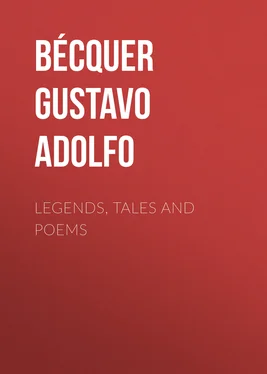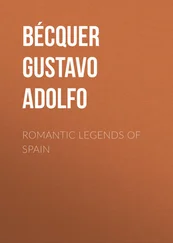Gustavo Bécquer - Legends, Tales and Poems
Здесь есть возможность читать онлайн «Gustavo Bécquer - Legends, Tales and Poems» — ознакомительный отрывок электронной книги совершенно бесплатно, а после прочтения отрывка купить полную версию. В некоторых случаях можно слушать аудио, скачать через торрент в формате fb2 и присутствует краткое содержание. Жанр: foreign_prose, literature_19, foreign_antique, на английском языке. Описание произведения, (предисловие) а так же отзывы посетителей доступны на портале библиотеки ЛибКат.
- Название:Legends, Tales and Poems
- Автор:
- Жанр:
- Год:неизвестен
- ISBN:нет данных
- Рейтинг книги:5 / 5. Голосов: 1
-
Избранное:Добавить в избранное
- Отзывы:
-
Ваша оценка:
- 100
- 1
- 2
- 3
- 4
- 5
Legends, Tales and Poems: краткое содержание, описание и аннотация
Предлагаем к чтению аннотацию, описание, краткое содержание или предисловие (зависит от того, что написал сам автор книги «Legends, Tales and Poems»). Если вы не нашли необходимую информацию о книге — напишите в комментариях, мы постараемся отыскать её.
Legends, Tales and Poems — читать онлайн ознакомительный отрывок
Ниже представлен текст книги, разбитый по страницам. Система сохранения места последней прочитанной страницы, позволяет с удобством читать онлайн бесплатно книгу «Legends, Tales and Poems», без необходимости каждый раз заново искать на чём Вы остановились. Поставьте закладку, и сможете в любой момент перейти на страницу, на которой закончили чтение.
Интервал:
Закладка:
LOS OJOS VERDES
Hace mucho tiempo que tenía ganas de escribir cualquier cosa con este título.
Hoy, que se me ha presentado ocasión, lo he puesto con letras grandes en la primera cuartilla de papel, y luego he dejado á capriclio volar la pluma.
Yo creo que he visto unos ojos como los que he pintado en esta leyenda. No sé si en sueños, pero yo los he visto. De seguro no los podré describir tales cuales ellos eran, luminosos, transparentes como las gotas de la lluvia que se resbalan sobre las hojas de los árboles después de una tempestad de verano. De todos modos, cuento con la imaginación de mis lectores para hacerme comprender en este que pudiéramos llamar boceto de un cuadro que pintaré algún dia.
I
—Herido va el ciervo, herido va; no hay duda. Se ve el rastro de la sangre entre las zarzas del monte, y al saltar uno de esos lentiscos han flaqueado sus piernas.... Nuestro joven señor comienza por donde otros acaban … en cuarenta años de montero no he visto mejor golpe.... ¡Pero por San Saturio,[1] patrón de Soria![2] cortadle el paso por esas carrascas, azuzad los perros, soplad en esas trompas hasta echar los hígados, y hundidle á los corceles una cuarta de hierro en los ijares: ¿no véis que se dirige hacia la fuente de los Álamos,[3] y si la salva antes de morir podemos darle por perdido?
[Footnote 1: San Saturio. Saint Saturius was born, according to Tamayo, in 493. In 532 he withdrew from the world into a cave at the foot of a mountain bathed by the river Duero, near where now stands the town of Soria. There he lived about thirty-six years, or until 568, when he died and was buried by his faithful disciple St. Prudentius, later bishop of Tarazona, who had been a companion of the hermit during the last seven years of his life. His cave is still an object of pilgrimage, and a church has been built on the spot to the memory of the saint. See Florez, España Sagrada, Madrid, 1766, tomo vii, pp. 293–294.]
[Footnote 2: Soria. A mediaeval-looking town of 7296 inhabitants situated on a bleak plateau on the right bank of the Duero. It is the capital of a province of the same name. The old town of Numantia (captured by the Romans under P. Cornelius Scipio AEmilianus, 133 B.C.) lay about three miles to the north of the present site of Soria.]
[Footnote 3: Álamos. The choice of a grove of poplars as setting to the enchanted fount is peculiarly appropriate, as this tree belongs to the large list of those believed to have magical properties. In the south of Europe the poplar seems to have held sometimes the mythological place reserved in the north for the birch, and the people of Andalusia believe that the poplar is the most ancient of trees. (See de Gubernatis, Za Mythologie des plantes , Paris, Reinwald, 1882, p. 285.) In classical superstition the black poplar was consecrated to the goddess Proserpine, and the white poplar to Hercules. "The White Poplar was also dedicated to Time, because its leaves were constantly in motion, and, being dark on one side and light on the other, they were emblematic of night and day.... There is a tradition that the Cross of Christ was made of the wood of the White Poplar, and throughout Christendom there is a belief that the tree trembles and shivers mystically in sympathy with the ancestral tree which became accursed.... Mrs. Hemans, in her 'Wood Walk,' thus alludes to one of these old traditions:
FATHER.—Hast thou heard, my boy,
The peasant's legend of that quivering tree?
CHILD.—No, father; doth he say the fairies dance
Amidst its branches?
FATHER.—Oh! a cause more deep,
More solemn far, the rustic doth assign
To the strange restlessness of those wan leaves.
The Cross he deems—the blessed Cross, whereon
The meek Redeemer bow'd His head to death—
Was formed of Aspen wood; and since that hour
Through all its race the pale tree hath sent down
A thrilling consciousness, a secret awe
Making them tremulous, when not a breeze
Disturbs the airy Thistle-down, or shakes
The light lines from the shining gossamer."
Richard Folkard, Plant Lore , London, 1892, p. 503.]
Las cuencas del Moncayo[1] repitieron de eco en eco el bramido de las trompas, el latir de la jauría desencadenada y las voces de los pajes resonaron con nueva furia, y el confuso tropel de hombres, caballos y perros se dirigió al punto que Iñigo, el montero mayor de los marqueses de Almenar,[2] señalara,[3] como el más á propósito para cortarle el paso á la res.
[Footnote 1: El Moncayo. See p. 8, note 1.]
[Footnote 2: Marqueses de Almenar. A title taken doubtless from the little town of Almenar (650 inhabitants) situated in the province of Soria near the right bank of the Rituerto river, southwest of the Moncayo, and not far from that mountain.]
[Footnote 3: señalara. A relic of the Latin pluperfect (in -aram , -eram ), popularly confounded with the imperfect subjunctive. Its use is now somewhat archaic, and is restricted to relative clauses. See Ramsey's Spanish Grammar , H. Holt & Co., 1902, § 944.]
Pero todo fué inútil. Cuando el más ágil de los lebreles llegó á las carrascas jadeante y cubiertas las fauces de espuma, ya el ciervo, rápido como una saeta, las había salvado de un solo brinco, perdiéndose entre los matorrales de una trocha, que conducía á la fuente.
–¡Alto!… ¡Alto todo el mundo! gritó Iñigo entonces; estaba de Dios que había de marcharse.
Y la cabalgata se detuvo, y enmudecieron las trompas, y los lebreles dejaron refunfuñando la pista á la voz de los cazadores.
En aquel momento se reunía á la comitiva el héroe de la fiesta, Fernando de Argensola,[1] el primogénito de Almenar.
[Footnote 1: Argensola. A name familiar to students of Spanish literature from the writings of the illustrious brothers Bartolomé and Lupercio Leonardo de Argensola (sixteenth century). It is also the name of a small town of some 560 inhabitants in the province of Barcelona.]
—¿Qué haces? exclamó dirigiéndose á su montero, y en tanto, ya se pintaba el asombro en sus facciones, ya ardía la cólera en sus ojos. ¿Qué haces, imbécil? ¡Ves que la pieza está herida, que es la primera que cae por mi mano, y abandonas el rastro y la dejas perder para que vaya á morir en el fondo del bosque! ¿Crees acaso que he venido á matar ciervos para festines de lobos?
–Señor, murmuró, Iñigo entre dientes, es imposible pasar de este punto.
–¡Imposible! ¿y por qué?
–Porque esa trocha, prosiguió el montero, conduce á la fuente de los Alamos; la fuente de los Álamos, en cuyas aguas habita un espíritu del mal. El que osa enturbiar su corriente, paga caro su atrevimiento. Ya la res habrá salvado sus márgenes; ¿como la salvaréis vos sin atraer sobre vuestra cabeza alguna calamidad horrible? Los cazadores somos reyes del Moncayo, pero reyes que pagan un tributo. Pieza que se refugia en esa fuente misteriosa, pieza perdida.
–¡Pieza perdida! Primero perderé yo el señorío de mis padres, y primero perderé el ánima en manos de Satanás, que permitir que se me escape ese ciervo, el único que ha herido mi venablo, la primicia de mis excursiones de cazador.... ¿Lo ves?… ¿lo ves?… Aún se distingue á intervalos desde aquí … las piernas le faltan, su carrera se acorta; déjame… déjame… suelta esa brida, o te revuelco en el polvo.... ¿Quién sabe si no le daré lugar para que llegue á la fuente? y si llegase, al diablo ella, su limpidez y sus habitadores. ¡Sus! ¡ Relámpago ! sus, caballo mío! si lo alcanzas, mando engarzar los diamantes de mi joyel en tu serreta de oro.
Caballo y jinete partieron como un huracán.
Читать дальшеИнтервал:
Закладка:
Похожие книги на «Legends, Tales and Poems»
Представляем Вашему вниманию похожие книги на «Legends, Tales and Poems» списком для выбора. Мы отобрали схожую по названию и смыслу литературу в надежде предоставить читателям больше вариантов отыскать новые, интересные, ещё непрочитанные произведения.
Обсуждение, отзывы о книге «Legends, Tales and Poems» и просто собственные мнения читателей. Оставьте ваши комментарии, напишите, что Вы думаете о произведении, его смысле или главных героях. Укажите что конкретно понравилось, а что нет, и почему Вы так считаете.












